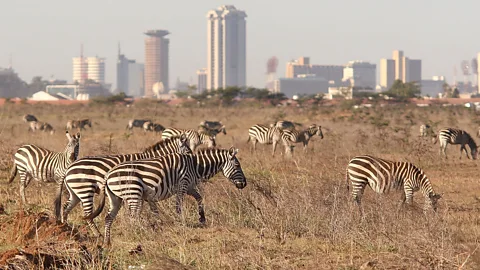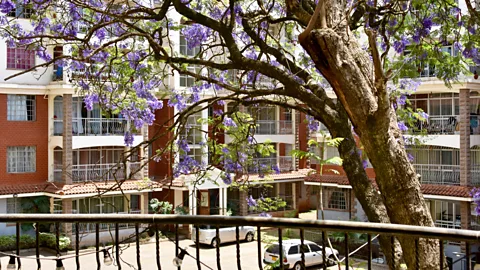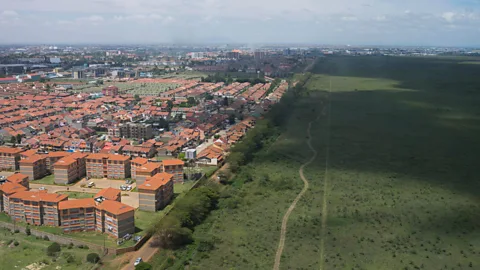Why millennials are heading for a wilder tech city
 Getty Images
Getty ImagesThis city is attracting ambitious expats from across the globe, writes Harriet Constable, but it’s a long way from Palo Alto.
In the summer of 2006, Timbo Drayson packed his bags and waved goodbye to Oxford University for a job at Google. He started in London, working on a fast-growing video product that eventually took him to the US. But by 2013 Drayson had quit and flown half way across the globe for Kenya’s capital. What happened?
“During my time at Google, I was working on building our developer ecosystem in the Middle East and Africa,” says Drayson. “I really enjoyed it and so decided to take a sabbatical, travelling around East and West Africa on a tech tour. [Along the way] I got inspired [by the] big problems that needed solving through technology.”
Nairobi has the most developed tech scene in East Africa rivalling hubs like Cape Town, Lagos and Cairo. This made it a smart, strategic choice for an entrepreneur like Drayson. Within a year, the Brit had co-founded OkHi, a company working to provide every person in Kenya with an address.
 Alamy
AlamyYet, for most of the world Nairobi remains an enigma. “Isn’t it dangerous” and “do people live in mud huts there” are some of the questions expats regularly field from family around the globe. They’re surprised to hear Nairobi is one of the fastest growing cities in Africa, with over three million inhabitants.
Within eight years it has transformed in to a cosmopolitan hub drawing young people from across Africa and now India and China. There are skyscrapers and shopping malls; hotels and apartment blocks; cinemas, bars, restaurants and even an ice rink.
Since 2008, a crop of incubators, accelerators and funders have popped up, propelling many startups in to profit. Last year, for example, Sendy, Kenya’s first on-demand delivery service, hit its $2m funding goal with the support of the Safaricom Spark Fund and XL Africa accelerator, which is funded by the World Bank.
A Disrupt Africa report, shows tech start-ups across Africa raised over $129 million in 2016, a 17% increase on the previous year, with Kenya attracting the second highest investment after South Africa. One of the beneficiaries, Moringa, a Nairobi-based coding school that develops African tech talent, has been able to expand globally with this financial support, launching offices in Hong Kong, Ghana and Pakistan since 2014.
 Alamy
AlamyStill, Nairobi isn’t an obvious choice for a young expat. To be sure there are some significant downsides and cultural challenges for foreigners here, homosexuality, for example, is still illegal in Kenya. Crime is another concern, while walking around the city during the day is perfectly fine, exploring on foot at night is not recommended. Women can travel around the city alone and are free to dress as they like but conservative clothing is recommended in some areas beyond the city limits. Tribal and political tensions sometimes bubble up and cause violence, particularly around election times. Most people in the capital however, consider themselves to be ‘Nairobians’ first, and are happy to talk about their country’s history, their tribes and their world views.
It languishes at number 186 on Mercer’s Quality of Living City Rankings 2017 which highlights traffic congestion; poor public transport; crime levels; housing; access to good schools and electricity supply, which can be intermittent in the capital. And with its growing population, second-hand cars, burning rubbish, and wood-fired stoves, Nairobi’s air pollution has become a significant problem.
However, Tia Peng, 30, believes a combination of opportunity, good weather and good people are what makes Nairobi appeal. She relocated from Guang Dong Provence in China to work for Shenzen Right Net Tech Co, an ecommerce company that sells Chinese goods to Africa and African goods to China. “I plan to stay in Nairobi for a long time, at least 5 years. The city is good, I especially love the weather, it’s 25 degrees and sunny all year around, and the local people are friendly.”
Asked what her family think about her living in Kenya, Peng says, “My family think it’s a good thing I’ve come to Kenya to develop my career, the Chinese believe Africa has a bright future. There are very many opportunities for young people and the salaries are higher [in Kenya than in China]”.
Utsav Misty, 32, is an Indian expat working for mobile gaming company Vuclip in Nairobi agrees. He also moved here because of the opportunities available to him: “Where I come from [Mumbai, India] the market is very competitive. [In Nairobi] we Indians can apply the skills and technology we use at home more easily. The Kenyan market is responsive and they like the technologies we bring.”
 Harriet Constable
Harriet ConstableWhat’s the draw? High-speed internet, globally-renowned innovation, major funding and the presence of incubators and hubs all appeal to tech talent. “There’s a large amount of brain power focusing on similar challenges [in Nairobi]. The barrier for entry [for new companies] is low because everything is concentrated – if you have all of the people and all of the money in one place it makes it way easier,” says Samir Ibrahim, 29, a US expat and CEO of SunCulture, a company which provides solar-powered irrigation to farmers. Like many millennials, the ex-New York University student wanted a meaningful job, and says a tech start-up in Kenya provided that.
Money is being pushed in to infrastructure - from the newly built tarmac road link to Ethiopia, to the new Standard Gauge Railway between Nairobi with Mombasa on the coast. “Kenya is an English-speaking country, its generally safe, western investment has been coming into the country for a long time and it’s a hub for tourism. These are the foundation points of a good hub,” adds Ibrahim.
 Alamy
AlamyWhere to go
Situated on the fourth floor of Piedmont Plaza on the Ngong Road – one of the main roads leading east to west across the city – Nairobi Garage, a co-working space for start-ups, techies and entrepreneurs has become a popular place for work. “There are a few main places to hang out and because the expat community is tight – when you’re new in town older expats will invite you along to things. It feels like things are possible here, the mentality is ‘the sky’s the limit,’” says Hannah Clifford, 29, director at Nairobi Garage.
Another favourite is Nairobi’s first incubator, iHub, in Kilimani, a central Nairobi suburb. The terrace here offers great views of the city. Many expats choose to regularly work from coffee shops like Wasp & Sprout, a bohemian little café in Loresho serving cold brew coffee on colourful sofas. After work drinks are popular at Brew Bistro, a rooftop bar in Westlands complete with picnic tables, AstroTurf grass and home-brewed beers; The Alchemist, an open-air bar with live music most nights of the week, and J’s, a restaurant and bar with outdoor seating and a DJ playing party tunes until the early hours at the weekend.
Westlands has long been a popular location for expats to live as well as party due to its central city location and the proximity to shops, restaurants and the Karura Forest, a huge forest with hiking trails and an open-air restaurant called the River Café. There’s a range of accommodation here from apartment blocks for singletons to houses for families. Kilimani, Kilileshwa and Lavington are also popular areas in the leafy suburbs, yet a short drive to the central business district. Properties favoured by expats here tend to be plush modern apartments complete with gyms and swimming pools.
 Getty Images
Getty ImagesSpending power
Salaries in the tech sector in Kenya vary hugely from company to company and there is little information available for benchmarking one organisation against the next, for example, one start-up may pay a $40,000 salary for an I.T. project leader but according to Glassdoor.com others can be much lower ($15,000-$20,000). While wages aren’t high versus the UK or US this income is enough to live comfortably in Nairobi. Fresh food is cheap and monthly rent for an unfurnished two bed apartment in Kilimani, a popular expat area, is approximately 90,000ksh ($874) a month. Beer in a bar costs on average KSH 200 ($1.90), and internet packages cost around KSH 4000 ($38) a month. Expat luxuries like cheese and wine can be expensive but according to website Expatisan.com, the cost of living in Nairobi is 17% cheaper than Johannesburg, South Africa.
The tight-knit community, social scene and outdoor activities that appealed to Drayson on his initial visit. Nairobi seemed like somewhere he could enjoy living. “I figured if I’m going to start a business in a new country where I don’t know anyone, I need to be happy and I felt I could be happy,” says Drayson. “It had the creature comforts of Ribena and Haribo in the supermarkets, and Kenyans have a great sense of humour. As a British person that makes me feel at home. I also love the outdoors and camping and the country is great for that.”
Drayson expects to see more like-minded ex-Googlites quitting Silicon Valley for Silicon Savannah. “As long as there are big problems to solve there’s an opportunity. Every year companies are growing, hiring talent and training talent,” he says.
Kenyan-born Maurice Otieno, 27, general manager at Metta, a club for entrepreneurs agrees. He too is confident that Nairobi’s tech scene will keep attracting global talent. He believes one particular draw could be around the farming industry, which is a huge part of the Kenyan economy and much in need of tech innovation to develop in the coming years. “We expect to see big things in the agritech space [in 2018 and beyond], it’s an optimistic time. We’ll keep making a concerted effort to bring people together and to make expats feel welcome. We Kenyans are just loving people!”
To comment on this story or anything else you have seen on BBC Capital, please head over to our Facebook page or message us on Twitter.
If you liked this story, sign up for the weekly bbc.com features newsletter called "If You Only Read 6 Things This Week". A handpicked selection of stories from BBC Future, Culture, Capital and Travel, delivered to your inbox every Friday.
